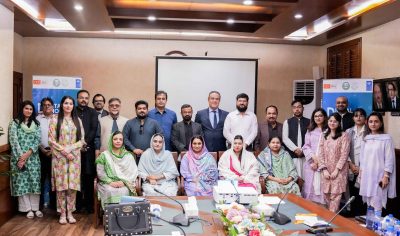
The Pakistan Institute for Parliamentary Services (PIPS), in collaboration with the United Nations Development Programme (UNDP) and the Centre for Excellence in Journalism (CEJ), successfully hosted a workshop on “Digital Democracy” on Wednesday, September 18, 2024, at the Sindh Assembly Secretariat, Karachi.
The event commenced with the opening remarks by Ms. Samer Awais, Director General (DG), PIPS, who introduced PIPS and its partnership with UNDP and CEJ to deliver training on digital democracy, social media, and combating misinformation. She expressed her gratitude to the participants, highlighting the success of a previous pilot session with National Assembly parliamentarians and underscoring the importance of gathering feedback to refine future training programs.
Ms. Awais also extended heartfelt thanks to the Honourable Speaker of the Sindh Assembly/Member Board of Governors, PIPS, Syed Awais Qadir Shah, acknowledging that the workshop would not have been possible without his unwavering support. She emphasized that PIPS deeply appreciated the Speaker’s commitment to advancing the digital capabilities of parliamentarians, which played a pivotal role in making the event a success.
Dr. Ali Al-Bayati, Chief Technical Advisor for SELP at UNDP, then took the floor, expressing his enthusiasm for the collaboration between PIPS and CEJ. He discussed the growing issue of misinformation and introduced iVerify Pakistan, a fact-checking platform designed to address this challenge. Dr. Ali encouraged the parliamentarians to utilize the platform and report any misleading information they encountered, emphasizing misinformation’s significant impact on society.
Before the main sessions began, a pre-survey was conducted to assess the participants’ knowledge of information manipulation and social media.
Farieha Aziz, a Karachi-based, APNS-award-winning journalist, and co-founder and Director at Bolo Bhi,led a session engaging the Members about their social media habits. Most participants mentioned using Facebook and TikTok, with some highlighting the use of WhatsApp channels during election campaigns. Farieha guided the discussion towards understanding voter demographics based on social media platform usage. Notable contributions came from Rehan Rajput of PTI, who shared insights on how Facebook META played a crucial role in their election campaign, and Muhammad Farooq of JI, who discussed the use of YouTube for voter engagement through video messages.
Farieha also addressed Ethical and Legal Concerns related to social media usage, offering practical advice on enabling safety settings, recovering lost data, understanding cookies, and turning off location services to prevent hacking and data breaches. Her session provided essential tips for securing digital devices and safeguarding personal information online.
Kamal Siddiqi , a prominent journalist and media expert, led a session focused on current social media trends in Pakistan, noting the rise of Instagram as a widely used platform. He discussed the dynamics of information manipulation and the rapid spread of false or manipulated content across social media. Kamal emphasized the importance of vigilance and critical thinking in consuming and sharing digital information, highlighting the role, misinformation played in shaping public opinion.
The event concluded with a discussion on how these insights could be applied to the Members’ digital engagement strategies, reinforcing the importance of responsible digital behavior in fostering informed, democratic discourse